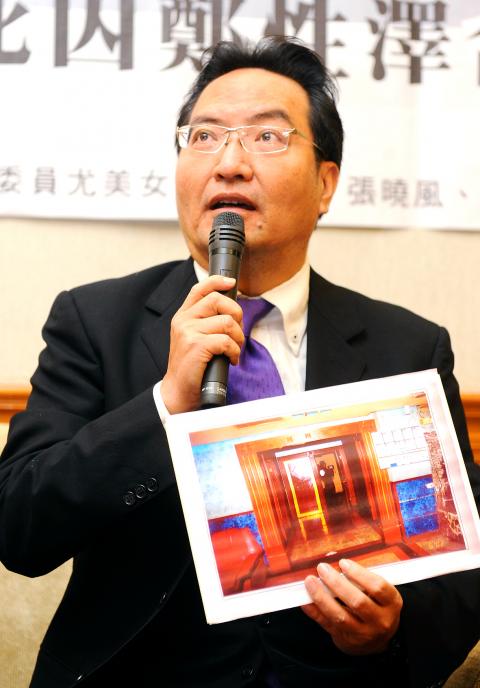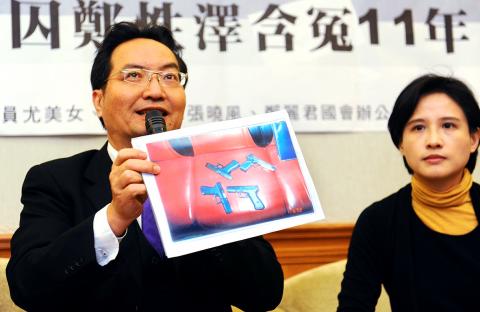Human rights activists and lawmakers yesterday challenged the death sentence against Cheng Hsing-tse (鄭性澤), saying that hard evidence supporting his conviction, as well as steps in standard operation procedures in investigating the homicide case, were missing.
“I would like to ask everyone in the judiciary to carefully examine all the evidence, and answer this question: Do you feel comfortable sentencing this person to death?” Law Bing-ching (羅秉成), the lawyer who represents Cheng, told a press conference at the legislature. “I am an attorney and I would say that after looking at the evidence we have seen so far, I would not be comfortable doing so.”
Cheng was accused of murdering a police officer, Su Hsien-pi (蘇憲丕), during an exchange of fire in a KTV room in then-Taichung City on Jan. 2, 2002.

Photo: Chang Chia-ming, Taipei Times
On that day, police were called to handle a shooting incident in a KTV room, after a drunk man, Lo Wu-hsiung (羅武雄), fired two shots — one at the ceiling and another at a bottle of liquor — in the room.
An exchange of fire took place immediately after police officers entered the room.
Both Su and Lo were killed, by three and two gunshots respectively, while several others in the room, including Cheng, were wounded.

Photo: Chang Chia-ming, Taipei Times
After investigations and meetings, the court concluded that, while Lo fired the first shot, Cheng had fired the next two shots, and sentenced Cheng to death.
Despite several appeals and extraordinary appeals, the efforts to save Cheng have so far been in vain.
Law said there was no evidence that anyone besides Lo had fired at the police officers.
In addition, Cheng has said that police used torture during interrogation to extract a confession from him, Lo added.
“Most importantly, standard procedures, such as ballistic analysis and video recordings of the immediate investigation on the crime scene, are missing,” Law said.
The National Police Agency first said that there was no video recording of the crime scene. However, after Lo showed the police a photograph taken at the crime scene showing an officer holding a camcorder, the agency retracted its statement, and said that there was a video recording, but the cameraman had been ordered to stop recording as he was getting in the way of photographers, Law said.
“The agency is lying. We’ve found a video clip of the police interrogation of Cheng, and the officer interrogating Cheng clearly stated that ‘the entire investigation process was recorded on video,’” Law said.
“I don’t know whether the missing video clip would be good or bad for Cheng, but it may be the key to discovering the truth,” Law said. “I urge the agency to give us the video clip.”
“You don’t have to be a legal expert to know that there’s something fishy about the case,” People First Party Legislator Chang Show-foong (張曉風) said.
“I don’t support abolishing capital punishment, but it’s not justified to execute someone who has not committed a crime. This is not only about a precious life, but also about protecting the judiciary’s dignity,” she said.
Chang and Democratic Progressive Party Legislator Cheng Li-chun (鄭麗君) urged the public to show more concern about the case and to pressure the Ministry of Justice to reexamine it.
“If we do nothing to stop execution of an innocent person, the judiciary would become a murderer, and, since we have not done anything to stop it, we are all guilty,” Cheng Li-chun said.

‘DENIAL DEFENSE’: The US would increase its military presence with uncrewed ships, and submarines, while boosting defense in the Indo-Pacific, a Pete Hegseth memo said The US is reorienting its military strategy to focus primarily on deterring a potential Chinese invasion of Taiwan, a memo signed by US Secretary of Defense Pete Hegseth showed. The memo also called on Taiwan to increase its defense spending. The document, known as the “Interim National Defense Strategic Guidance,” was distributed this month and detailed the national defense plans of US President Donald Trump’s administration, an article in the Washington Post said on Saturday. It outlines how the US can prepare for a potential war with China and defend itself from threats in the “near abroad,” including Greenland and the Panama

A wild live dugong was found in Taiwan for the first time in 88 years, after it was accidentally caught by a fisher’s net on Tuesday in Yilan County’s Fenniaolin (粉鳥林). This is the first sighting of the species in Taiwan since 1937, having already been considered “extinct” in the country and considered as “vulnerable” by the International Union for Conservation of Nature. A fisher surnamed Chen (陳) went to Fenniaolin to collect the fish in his netting, but instead caught a 3m long, 500kg dugong. The fisher released the animal back into the wild, not realizing it was an endangered species at

The High Prosecutors’ Office yesterday withdrew an appeal against the acquittal of a former bank manager 22 years after his death, marking Taiwan’s first instance of prosecutors rendering posthumous justice to a wrongfully convicted defendant. Chu Ching-en (諸慶恩) — formerly a manager at the Taipei branch of BNP Paribas — was in 1999 accused by Weng Mao-chung (翁茂鍾), then-president of Chia Her Industrial Co, of forging a request for a fixed deposit of US$10 million by I-Hwa Industrial Co, a subsidiary of Chia Her, which was used as collateral. Chu was ruled not guilty in the first trial, but was found guilty

DEADLOCK: As the commission is unable to forum a quorum to review license renewal applications, the channel operators are not at fault and can air past their license date The National Communications Commission (NCC) yesterday said that the Public Television Service (PTS) and 36 other television and radio broadcasters could continue airing, despite the commission’s inability to meet a quorum to review their license renewal applications. The licenses of PTS and the other channels are set to expire between this month and June. The National Communications Commission Organization Act (國家通訊傳播委員會組織法) stipulates that the commission must meet the mandated quorum of four to hold a valid meeting. The seven-member commission currently has only three commissioners. “We have informed the channel operators of the progress we have made in reviewing their license renewal applications, and